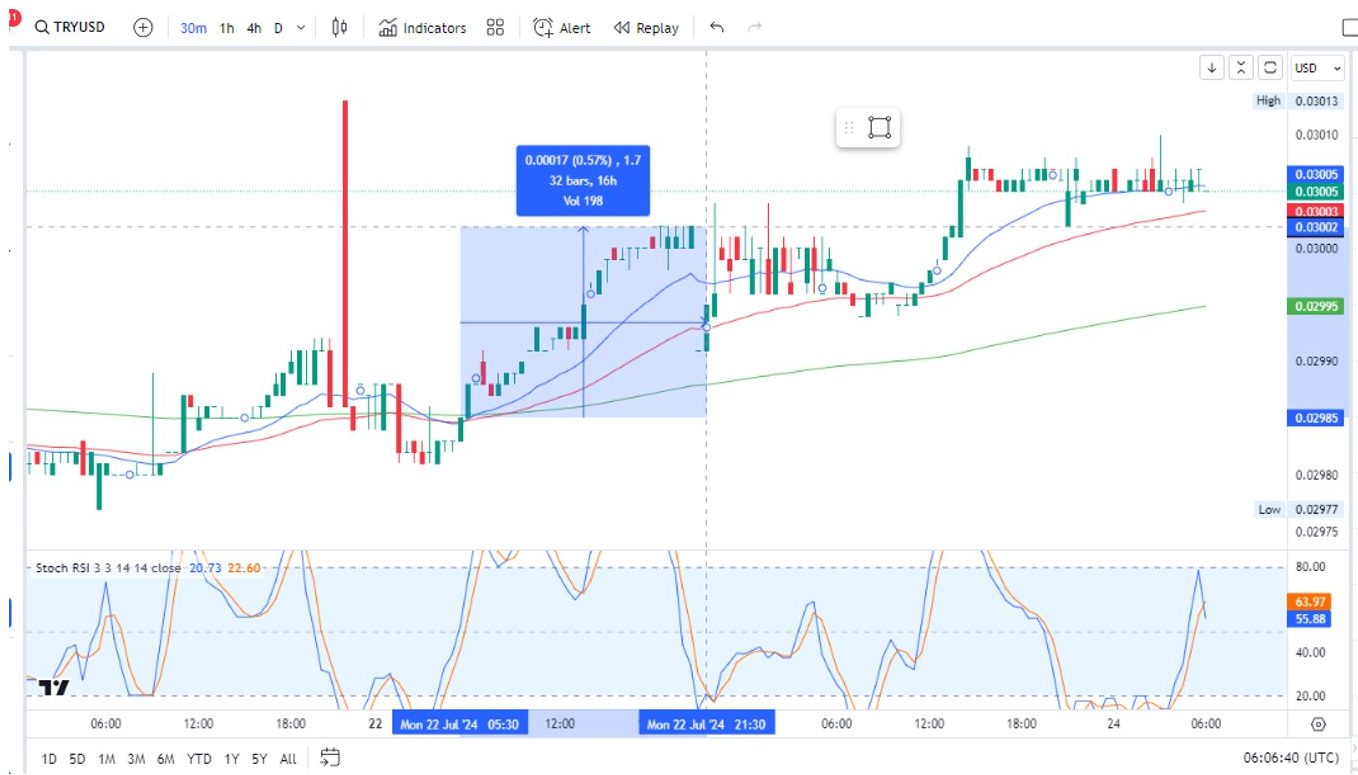Forex Trading in Turkey



The forex market in Turkey offers an excellent trading experience through robust regulatory oversight by the Capital Markets Board (CMB), high-leverage opportunities, and a transparent tax system.
The latest data from the Bank of International Settlements (BIS) reveals that the average daily turnover of forex trades in the country totalled $18 billion in 2022. This was down 5.26% from levels recorded in 2019.
Let’s look closer at forex trading in Turkey and a trade example involving the TRY/USD.
Quick Introduction
- The Capital Markets Board (CMB), a ‘yellow tier’ regulator in line with DayTrading.com’s Regulation & Trust Rating, oversees the financial markets including forex trading, ensuring security and transparency.
- The TRY is commonly pitted against prominent currencies such as the US Dollar (USD), Euro (EUR), or British Pound (GBP), providing higher liquidity and tighter spreads than exotic or less frequently traded pairs.
- Profits from forex trading are typically subject to income tax, with rates starting from 15%, and payable to the Turkish Revenue Administration.
Top 4 Forex Brokers in Turkey
Our tests reveal these 4 platforms are the best for forex traders in Turkey:
How Does Forex Trading Work in Turkey?
Forex trading in Turkey works pretty much like in most other countries. It involves buying and selling currency pairs, such as the TRY/USD, to profit from market price fluctuations.
To start day trading currencies online, you’ll need to:
- Open an account with a forex broker – trading firms should be authorized by the CMB.
- Deposit funds in Turkish Lira – some platforms offer TRY accounts, facilitating convenient deposits.
- Execute currency trades – your broker will provide a desktop, web terminal, or forex app.
Is Forex Trading Legal in Turkey?
Forex trading with domestic and international brokers is legal and subject to stringent regulations enforced by the Capital Markets Board of Turkey (CMB).
The CMB regulates forex trading activities to ensure they are conducted fairly and transparently, protecting retail investors, including day traders.
Forex brokers should be registered and comply with the regulatory standards set by the CMB. They must ensure client funds are held in segregated accounts and provide adequate disclosure and reporting.
Is Forex Trading Taxed in Turkey?
Generally, profits from forex trading in Turkey are considered income and are taxed accordingly. For individual investors, the rate typically ranges from 15% to 35%.
The Turkish tax year follows the typical calendar year, with returns due to the Turkish Revenue Administration by 31 March of the following year.
Turkish tax laws are subject to change and can be complex, so I recommend consulting a tax professional familiar with forex trading to ensure compliance with local laws.
When Is the Best Time to Trade Forex in Turkey?
Overlapping trading sessions are generally the best times to trade forex, as these times typically offer the highest level of liquidity.
The overlapping US and London markets generally have the most trading activity and opportunities, so between 8:00 and 11:00 am EST (3:00 and 6:00 pm in Istanbul) seems to be the optimal trading window.
European currencies are most active during this time and offer the most liquidity for currency pairs involving the Euro, Pound Sterling, and Swiss Franc.
Example Trade
Here’s an example of a TRY/USD day trade I executed to show you how forex trading can work in practice…
Technical Analysis
I used the momentum bounce strategy to execute a trade in the 30-minute timeframe.
Price action broke through the 200, 50, and 20-day moving averages with stochastic indicators pointing upwards and showing an oversold position, so I entered at the close of the first bullish candle.

Position Sizing & Risk Management
I always calculate the appropriate position size based on my risk management rules.
I never risk more than 1% of my account balance, setting a stop-loss order to manage potential losses.
Trade Entry
Following a big sell-off at the market’s opening, I analyzed the lower time frames for signs of bearish exhaustion and waited for price action to turn bullish and break through the three moving averages.
Using stochastics and reading price action, I entered at the close of the first bullish candle to break through the moving averages.
Trade Exit
After monitoring my trade closely and paying attention to established levels on the 1hr, 4hr, and daily timeframes, I set a take profit order, allowed my trade to play out as planned, and exited at 0.03000.
Post-Trade Analysis
A quick analysis of my trading plan and whether I had followed my strategy helped me review my performance, note any lessons learned, and determine how to tweak my strategy for future trades.
Bottom Line
With strict regulatory controls, tax benefits, high-leverage opportunities, and advanced platform technology, you can enjoy a secure and potentially profitable trading experience in the Turkish forex market.
Many brokers offer competitive spreads and low fees, adding to the attraction of Turkish trading. However, make sure you are compliant in terms of your tax obligations, and keep in mind that the Turkish lira is a volatile currency when considering risk management.
To get started, see our pick of the best forex day trading platforms.
Recommended Reading
Article Sources
- Capital Markets Board (CMB)
- Bank for International Settlements (BIS)
- Central Bank of the Republic of Turkey
- Turkish Revenue Administration
- Turkey Individual Tax Administration - PwC
The writing and editorial team at DayTrading.com use credible sources to support their work. These include government agencies, white papers, research institutes, and engagement with industry professionals. Content is written free from bias and is fact-checked where appropriate. Learn more about why you can trust DayTrading.com



